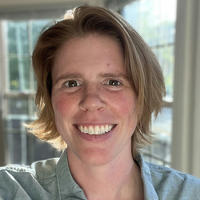
Curriculum Vitae
et106@wellesley.edu
Physics & Astronomy
B.S., Brown University; Ph.D., University of Michigan
Science Center E444
Erin Teich
Assistant Professor of PhysicsSoft matter physicist fascinated by emergent behavior in complex systems. Interested in entropy, geometry, networks, self-assembly, and disorder.
Nature organizes itself with often startling complexity at every length scale accessible to human inquiry. From the molecular structure of icebergs, to the formation of cell membranes that enable the processes of human life, to the spontaneous patterns that emerge in starling murmurations: all of these phenomena are governed by beautiful (and often simple) physical mechanisms. My research focuses on understanding how these fundamental rules give rise to macroscale behaviors, with the ultimate goal of using that understanding to design new emergent structures and dynamics.
My lab focuses primarily on phenomena within soft matter physics, a realm in which (usually) squishy materials, susceptible to thermal fluctuations, might spontaneously crystallize or else spectacularly fail and form disordered glasses. We use numerical simulation, statistical physics, and network science to create and explore models of these materials, in order to elucidate the relevant fundamental mechanisms at play, and ultimately design new soft and responsive materials. Lately, we have also been interested in structural organization in the human brain, and applying the soft matter physicist’s toolkit to better understand the neuronal architecture of white matter.
Scientific inquiry, no matter the context, has the distinct ability to capture the imagination and empower learning. As a teacher, I seek to embody this message, by creating an atmosphere grounded in respect that encourages learners to ask questions, approach subjects without fear, and internalize the idea that they belong to the world of scientific scholarship just as much as any other student or famous scientist that they know. This year, I am teaching PHYS 107 (Principles and Application of Mechanics) in a studio-style format that will facilitate student participation, open inquiry, and students’ sense of belonging within the physical sciences.
I am also very interested in the broader conversation around who receives credit within the scientific community, and who does not. For example, whose work is typically cited within our textbooks and our academic papers, and thereby canonized in the historical narrative of scientific progress and triumph? Whose work is not cited and is thereby excluded from that narrative? I have done some research that quantifies the under-citation of authors with women’s names within physics journals (relative to authors with men’s names), and I look forward to future work on this front, including listening to and learning from the many others also doing research in this arena.
I love team sports (both playing and watching), sandwiches, and hiking. I wish I played the guitar better, like a lot better, and I am hopelessly devoted to my cat. Once I was trapped in an airport in Tokyo for about 36 hours, but it was worth it. And I think Iceland is the most beautiful place I’ve ever been, perhaps tied with Scotland. Apparently I love a brooding sky.
